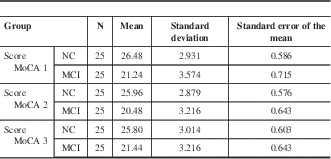
Here, we aimed to develop a short-form MoCA Chinese version (s-MoCA-CHN) to detect MCI and dementia. Therefore, it is necessary to develop a validated Chinese short version to detect cognitive impairment in the elderly Chinese population. Moreover, these abbreviated MoCAs were created for English-speaking populations. Consequently, it is challenging to accurately generalize these short forms to other neurological samples (particularly elderly community participants). These brief versions with differing content and test properties suffer from small sample sizes, limited applicability to clinical samples, less rigorous methodology used to derive the s-MoCA and suboptimal methods for the clinical diagnosis of dementia.

Several different abbreviated versions of the MoCA have been identified by systematic literature searches ( Liew, 2019 McDicken et al., 2019).
#Montreal cognitive assessment moca scoring full
This is critical because relatively short-form versions of the MoCA (s-MoCA) would ease administration of the test in these populations compared with the full MoCA. In addition, there seems to be a strong need for a short cognitive test that can be conducted with visually or hearing-impaired populations, as well as other clinical populations (stroke patients). Moreover, an abbreviated MoCA that maintains its diagnostic accuracy may have particular utility because the elderly population (particularly the oldest group) may struggle to complete the full MoCA. However, this is too long for initial screening in busy routine healthcare visits. The MoCA takes ~10–15 min to administer ( Roalf et al., 2016). In addition, the MoCA is more sensitive in identifying MCI and mild dementia ( Tan et al., 2015). Compared with the MMSE, the MoCA is significantly better in the detection of mild cognitive impairment (MCI) among people aged over 60 ( Tan et al., 2015 Pinto et al., 2019), and it also displays more effectiveness in detecting dementia ( Tan et al., 2015). These tests can be easily administered to participants and demonstrate diagnostic utility ( Wang and Dong, 2018). The Mini-Mental State Examination (MMSE) ( Folstein et al., 1975) and Montreal Cognitive Assessment (MoCA) ( Nasreddine et al., 2005) are two of the most common instruments. Many instruments used for cognitive impairment screening are available. Therefore, there is a strong need for adequate methods to screen for cognitive impairment.

While there is no cure for dementia, the early identification of cognitive impairment enables the identification and management of modifiable risk factors and can slow the progression of the disease ( Eshkoor et al., 2015). Dementia places a heavy burden on patients, caregivers, communities, and societies ( Jia et al., 2020). This number accounts for ~25% of the entire population with dementia worldwide ( GBD 2016 Dementia Collaborators, 2019). The Chinese short versions (sensitivity 0.89/0.90, specificity 0.72/0.77) are similar in performance to the full MoCA in identifying cognitive impairment (sensitivity 0.91, specificity 0.82).Ĭonclusions: These short variants of the MoCA may serve as quick and effective instruments when the original MoCA cannot be feasibly administered in clinical services with a high patient burden and limited cognitive testing resources.ĭementia is the most common disabling neurological disease in people older than 65 years and affects ~10 million people in China ( GBD 2016 Dementia Collaborators, 2019). Results: Six MoCA items with high discrimination and appropriate difficulty were included in the s-MoCA. Methods: Item response theory and computerized adaptive testing analytics were used to construct abbreviated MoCAs across a large neurological sample comprising 6,981 community-dwelling Chinese veterans. It is also important to develop a validated Chinese short version to detect cognitive impairment. Recent studies have created short forms of the Montreal Cognitive Assessment (s-MoCA) in English-speaking populations.
/alzheimers-and-montreal-cognitive-assessment-moca-98617-5bb7c858c9e77c0051582af1.png)


 0 kommentar(er)
0 kommentar(er)
